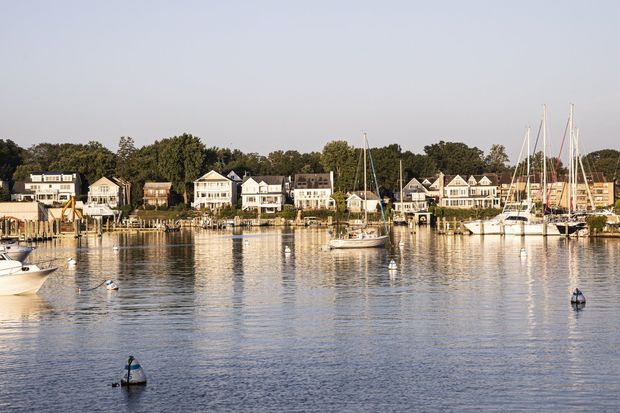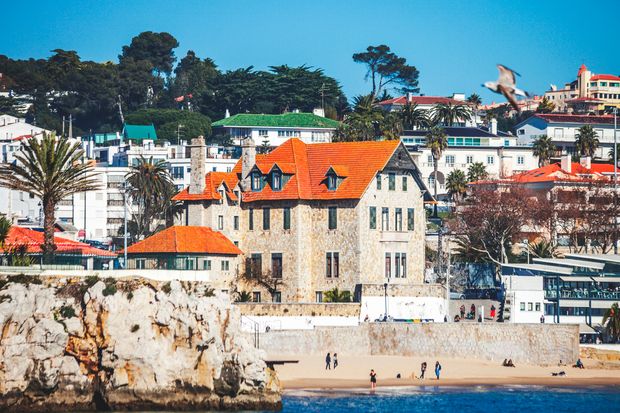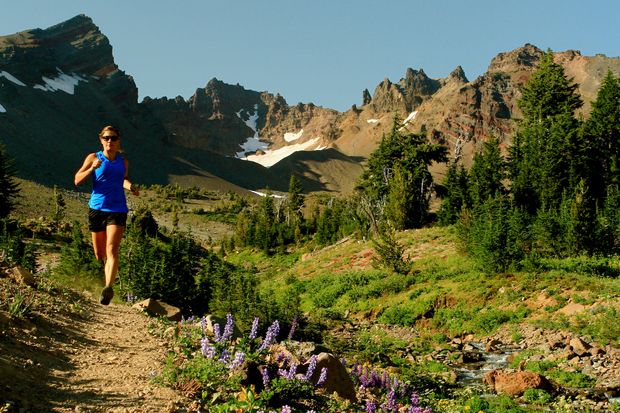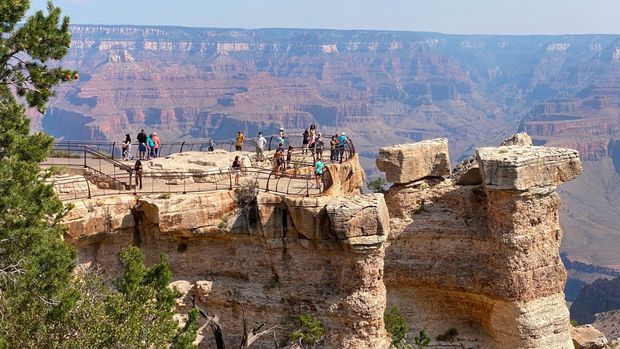
Homes along Annapolis’ Spa Creek.
Courtesy Visit Annapolis
Dear MarketWatch,
My wife and I will turn 59 soon and plan to retire mid-2021 (we’ll both be 59). We currently live in Houston, but want to move somewhere with nice scenery, more moderate weather and less traffic. We can both tolerate heat better than cold. Climate may not be so bad in retirement since we wouldn’t need to shovel the cars out of the snow to go to work every day.
We have both worked steadily for over 35 years; my wife has maxed out Social Security contributions for about 28 years and I have maxed out contributions for 31. We will have about $46,000 in pension income as well as access to retiree medical insurance. We have about $2.6 million in investible assets, no debt and a house worth about $480,000. We expect to spend around $600,000 on a home wherever we end up.
We like nature but also being close to a variety of sit-down restaurants and unique establishments. Our original plan was to move to Cascais, Portugal. The main thing for us is that it has good scenery, good weather and is walkable. But the current virus situation made us reconsider moving out of the U.S. where we would be the “outsiders” for a long time.
We are not “dreaming” of any specific spot or activities; we are pretty flexible in those areas. Enjoyment of our retirement years is the main factor.
We know this isn’t a lot of direction for you to make suggestions on, but I hope you can point out ideas that we had not considered here in the U.S. Work and a few vacations each year is all we’ve done for the past 34 years.
Regards,
L & K
Dear L & K,
Congratulations on your diligent saving, compounded by the power of time, that has you approaching a well-funded retirement. As you’re discovering, saving up is only part of the retirement process, no matter the size of your retirement nest egg.
When that last day of work hits, take a deep breath and…do nothing. Let yourself settle into your new reality before you pack up. Listen to yourself as you figure out new priorities and what will bring you joy in retirement. Don’t assume it will be easy given that you’ve been working pretty much nonstop for more than three decades.
Start with just writing down anything that you think you’d like to do, including things you never had time for in the Houston area. You also might want to consider a retirement coach.
Remember, the struggle is normal.
Read: This first year of early retirement has been one of the hardest of my life
Then go to Portugal. (I’m assuming we’ll be traveling freely by then.) Rent in Cascais — a city of 200,000 just 20 miles from Lisbon — for three months and see what it’s really like. Scary? Yes. But I’m guessing you won’t be an outsider for long, that you will quickly find other expatriates like yourselves. Tap into resources like Americans in Portugal and the local listings on Meetup. Look for a group on Facebook and start making contacts, perhaps before you arrive to make the settling-in process easier.

Cascais, Portugal
iStockphoto
And if you quickly realize that Cascais is a great place to vacation but is not your year-round dream destination after all, that’s OK. At least you’re not left wondering “what if”.
Then go explore some other part of Europe instead of changing your ticket to come home sooner. After all, you have that travel budget.
Read about another Portugal retirement possibility: Hot springs in January, no traffic, and universal health care — the best retirement escape you’ve never heard of
Also: Here’s one person’s experience of living in Portugal
If you decide to retire in the U.S., you have so many choices, as you realize. This country is beautiful, and your diligence in saving and investing opens up choices that others can’t afford. The MarketWatch “where should I retire” tool can help you create a longer shortlist. Why not travel throughout the country and live in those towns for a few weeks at a time? Stay longer if you like one, move on quickly if you don’t. Think about what is too small — or too big.
The search may also help you better define “enjoyment of our retirement.”
As you look, consider whether you need a big house or whether going smaller is worth it if it lets you live in a more beautiful location (Hawaii, suggested here).
I’ll get you started with these three suggestions:

You can always walk the Broken Top Trail instead of running it.
Pete Alport/Visit Bend
Bend, Oregon
Gorgeous scenery with both mountains and water. Plenty of hiking and cycling. A foodie scene that ranges from fine dining (and a chef with three James Beard nominations) and a culinary institute with its own restaurant to plenty of craft beer (Bend claims the largest ale trail in the western U.S., with 22 breweries). A vibrant downtown. The sunniest spot in Oregon.
The website Livability says this city of 100,000 in central Oregon “provides easy access to all the outdoor adventures you could ask for.”
Quirky fact: there’s a dormant volcano in town called Pilot Butte that offers great views of the Cascade mountains. But don’t miss the Newberry National Volcanic Monument 20 minutes outside of town and the hot springs at Paulina Lake a bit further away. And take some time for the 66-mile Cascade Lakes Scenic Byway.
Average summer highs are in the low 80s, and humidity is low.
You won’t find many places more walkable; Walkscore calls Bend a “walker’s paradise” and gives it 91 points out of 100.
Is this the place for you?
You will get snow — an average of about 7 inches to 8 inches in both December and January. But even then, average daytime highs are in the low 40s, and there’s not much rain.
Unlike many people, you have the housing budget for Bend. (Yes, it’s more expensive than Portland, according to Sperling’s Best Places.)
Here’s what homes are on the market now using listings from Realtor.com (which, like MarketWatch, is owned by News Corp.)

The Grand Canyon is just 80 miles from Flagstaff.
AFP via Getty Images
Flagstaff, Arizona
Here’s a laid-back mountain town where housing costs, while well above the national average, are cheaper than in Bend. Livability includes Flagstaff in its latest rankings of 100 best smaller and midsize cities to live in, citing an “impressive quality of life” and “tons of arts and entertainment options.” Its 75,000 residents value recreation and being outside. And with seven national parks sites within 80 miles, why not?
Of those, the Grand Canyon is furthest away, but just outside the city is Walnut Canyon National Monument. Head south, toward pricier Sedona, and drive through Oak Creek Canyon Scenic Drive.
Yes, there are four seasons, and I admit I was worried about the amount of snow — an average of 108 inches in downtown Flagstaff, according to the local tourism office. Yikes! Locals insist that while you can get a big snowstorm, it’s not like a storm that hits the Midwest or the East Coast. Here, at an elevation of 7,000 feet, it will be followed by sunshine and highs around 50, so snow won’t stick around for long. (Some newer homes even have heated driveways so you don’t have to shovel — or you could pay someone to do it.)
Of course, you can use a pending snowstorm to spend some time in the Phoenix area a little over 2 hours away. And skiers will head to the Arizona Snowbowl 15 miles up the road.
Still, this is a reason to spend some time experiencing Flagstaff in the winter before making a decision.
Otherwise the weather is beautiful from April through October. July highs average 82 degrees. There’s no humidity –a relief after Houston.
Unlike so much of Arizona, Flagstaff isn’t dominated by retirees, even as snowbirds. The Census Bureau says just 8.3% of the population here is 65 or older, half the national rate. Chalk some of that up to Northern Arizona University and its 20,000-plus students. As I’ve written before, I’m a fan of college towns because of the sports and cultural events they offer residents of all ages.
Walkability here is so-so. Interstate 40 and railroad tracks cut through town, so if you want to walk to local restaurants, you may want to live near downtown. On the other hand, you probably won’t drive more than 10 minutes to get anywhere in town. For more casual walking, enjoy the 56-mile Flagstaff Urban Trail System (FUTS).
Intrigued? Here’s what’s on the market, again using listings on Realtor.com.

Annapolis, Maryland
Your interest in Cascais has me thinking about a place on the water, but your aversion to Houston-style humidity has me skipping southern beach towns. Go too far north, and the winters rule them out (unless you want to turn winter into prime travel time). I’m also thinking of a place with enough to do year-round, so too rural or seasonal a spot could be a bad fit.
Annapolis, the capital of Maryland and on the Chesapeake Bay, could be a sweet spot. You’d have a somewhat walkable community of 39,000 (in a county of 580,000 people), paddleboarding and other water activities in a city that calls itself the sailing capital of the United States — plus the proximity to Maryland’s Eastern Shore and its beaches. Explore the area crab shacks until you get your fill of seafood. And then explore the rest of the local foodie scene.
While Annapolis has its share of theater, music and other cultural events — and check out the First Sundays Arts Festival — you’d also have easy access to big-city amenities in Washington, D.C. and Baltimore.
Average winter daytime highs are in the 40s, and average summer highs are in the upper 80s, meaning you’ll have more of that hot summer feeling than in either Bend or Flagstaff. Annapolis does get a bit of snow, mostly in January — an average of nearly 4 inches then.
Granted, this city is another pricey option, but you have the housing budget to handle it. Here’s what the local housing market looks like now.
A city alternative: Philadelphia, one of America’s most walkable cities and an hour to the Jersey Shore beaches.
Readers, where do you think L & K should retire? Leave your suggestions in the comments section.










Add Comment